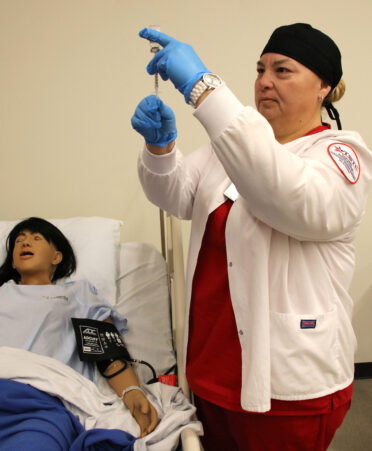(HARLINGEN, Texas) – Diabetes affects millions of youths and adults who suffer from its various types, and educating future health care workers about it is part of the Nursing program at Texas State Technical College.
According to the Centers for Disease Control and Prevention, diabetes occurs when a person’s pancreas cannot produce enough insulin to control the level of glucose in the bloodstream. Diabetes can cause eye, kidney, nerve and heart damage, and it is linked to some types of cancer.
Adrienne Reyes, a TSTC Nursing instructor, said her program teaches students about diabetes, its risk factors and complications, and treatment for patients with the disease.
“Students care for patients in a clinical setting, monitor for blood sugars, and administer anti-diabetic medications,” she said. “They visit wound-care areas and see many diabetic foot ulcers. The students observe the assessment by the physician and can assist with dressing changes.”
Reyes said that diabetes is prevalent throughout the southern Texas region.
“Many patients who have diabetes may also have comorbidities,” she said. “That can lead to blindness, heart disease and kidney failure in patients.”
Christopher Martinez, of Harlingen, is a first-semester Nursing student at TSTC, where he is studying for an Associate of Applied Science degree.
He said he has seen various patients during clinicals who exhibit signs of improper diabetes management.
“Patients have a habit of not monitoring their blood sugar level, and when they take their medication, it can possibly lead to a hypoglycemic issue,” he said. “I have seen individuals develop foot problems. That is a big risk factor.”
Luz Mejia, of Brownsville, is also studying for an Associate of Applied Science degree in Nursing.
She said some of her patient interactions have pertained to blood glucose monitoring.
“I make sure a patient’s sugar levels are within a certain range,” she said “If they aren’t, I advise a nurse so that person can get their insulin or medication.”
Ways to help control diabetes include committing to a healthier lifestyle, assembling a sick-day kit, and collecting recipes that can help manage blood sugar levels.
A sick-day kit can include items such as blood glucose monitoring supplies, ketone test strips, glucose tablets, a thermometer, hand sanitizer, and an alarm clock to serve as a reminder.
November is National Diabetes Month, an annual event to boost awareness about the disease.
TSTC offers an Associate of Applied Science degree in Nursing at its Harlingen and Sweetwater campuses. A Vocational Nursing certificate program is offered at the Breckenridge, Harlingen and Sweetwater campuses.
Registration for TSTC’s spring semester is underway. For more information, visit tstc.edu.
